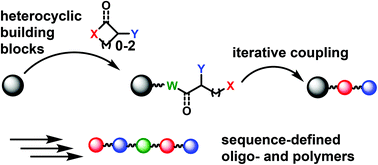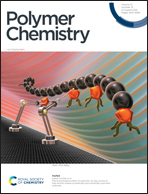Progress, challenges and future directions of heterocycles as building blocks in iterative methodologies towards sequence-defined oligomers and polymers
Abstract
The synthesis of sequence-defined oligomers and polymers is an important contemporary research topic due to the potential for creating materials with function tailored directly into the primary structure. Sequence-defined materials have so far been applied to biomimicry, data storage and sensing. Heterocyclic building blocks such as thiolactones and epoxides are key building blocks for producing sequence-defined macromolecules using iterative methodologies. In this review we critically evaluate: the current literature on different heterocyclic strategies using solid- or solution-phase methods for the iterative synthesis of sequence-defined polymers; the challenges surrounding these systems; and the potential future direction of heterocycles, so far not used in this field.



 Please wait while we load your content...
Please wait while we load your content...